Building a Balanced PC
Match CPU and GPU power — Don’t sleep on RAM or SSDs. Also plan for your workload: gaming, streaming, or other demanding tasks.
Ever wonder why our PC feels slow despite decent specs? Our Trusted PC Bottleneck Calculator pinpoints what’s holding you back and shows you how to fix it.
Think of a bottleneck calculator as a PC detective designed to identify performance limitations within a computer. It checks your CPU, GPU, RAM, and everything and spots if one part’s slacking, dragging the whole system down. As fellow gamers, we’ve all felt that lag. These tools use algorithms to compare the compatibilities between different parts by entering specific details and tell you what is causing possible bottlenecks.
Here’s what might be holding your system back and how to address it.
Your CPU’s the brain. When it can’t keep up with other specifications, your whole system stumbles, resulting in a CPU bottleneck.
If you have other components right but insufficient RAM, it can also slow everything down.
Slow storage means it can cause your system to experience long waits.
High resolutions look great but demand serious GPU power.
40% of gaming PCs had a CPU bottleneck
(TechRadar, 2023)25% faced GPU bottlenecks in high-res gaming
(IGN, 2023)18% reported RAM-related bottlenecks
(PCWorld Survey)Match CPU and GPU power — Don’t sleep on RAM or SSDs. Also plan for your workload: gaming, streaming, or other demanding tasks.
Upgrade only the bottleneck — Use our tool to identify what matters most and skip what doesn’t.
Keep drivers up to date — Clean your system regularly and monitor temps to avoid performance dips.
Let’s be honest, upgrading your system blindly is a waste of money. I don’t want that for you; that’s why. A bottleneck calculator like ours shows you exactly what’s off, so you fix the right part, whether it’s the CPU, GPU, or something else.
A CPU bottleneck means your processor can’t keep up with the rest of the system, leading to lower frame rates and stuttering, even if your GPU is underutilized. A GPU bottleneck means your graphics card is the limiting factor, causing frame drops and an inability to maintain desired graphics settings. Is my PC bottlenecked? This tool answers that directly.
You might experience mini pauses, especially during gameplay, or your games might simply not run at the desired frame rates. For anyone doing creative work, like graphic designers, it means slower render times. It all points back to an unbalanced system performance.
A $500 GPU paired with an old CPU can result in 30–60% underutilization, wasting both performance and money.
Our tool is designed to be simple, so you can get an analysis quickly and easily.
Our bottleneck calculator instantly compares your specs and tells you which component limits your system’s performance.
Simply select your CPU model and GPU model from the dropdown. Then, pick your desired resolution. Our PC part compatibility checker will start analyzing.
Once you hit the check bottleneck, you’ll get a percentage showing how much one part limits the others. Low is good, high means action’s needed.
We will provide you with a performance score from 0 to 100, indicating the severity of any detected bottleneck. A lower number is always better for you. We aim to give you a clear picture of your system’s needs.

Now, for example, the above image is where it shows It shows how much your system’s performance is being held back by the weaker component, usually the CPU or GPU
Make sure you’re selecting the exact models of your CPU and GPU. Also, consider your usual use case. Like, are you mostly gaming or editing, or are they heavy productivity tasks? Again, use our tool as a guide, not the ultimate answer.
We can provide you with a number, but knowing what to do with it is something you should know.
If your CPU’s at 100% while your GPU’s at 50%, you will get a CPU bottleneck. On the other hand, high GPU utilization with low CPU utilization points to a GPU bottleneck. Balance is key for you.
Understanding the specifics of your chosen CPU and GPU helps you make more accurate upgrade decisions. Our tool simplifies this by taking those factors into account.
High resolutions can drop your GPU power similarly, and low RAM can slow everything down. Make sure to match them to your needs.
WE try to not only look at the basics but also consider the future software needs and how some apps can stress your system differently to give a complete analysis
There are many other ones out there, but ours is specifically built for gamers and creators who want results they can trust, so they upgrade their specs strategically.
The best way would be to plan your PC build from the start with a balanced system like ours before buying anything
Let me help you break down what those percentages mean and what to do next.
Your score shows how much one component limits another. So I have made a table for your convenience
| Bottleneck % | Meaning | Action |
|---|---|---|
| 0–5% | Perfectly balanced | No upgrade needed |
| 5–10% | Minor bottleneck | Optional tweak |
| 10–30% | Noticeable performance drop | Consider upgrade |
| 30%+ | Major issues, poor performance | Upgrade immediately |
Our bottleneck calculator tells you if it’s your CPU, GPU, RAM, or storage holding you back, so you know where to invest. So, after identifying the factors
If you’re facing a CPU bottleneck, consider upgrading to a faster processor; if it’s a GPU issue, go for a card with more VRAM or power; and if your RAM is low, upgrading to 16 GB or more can help.
Let’s look at how some of our users have optimized their setups. by using our CPU/GPU bottleneck calculator
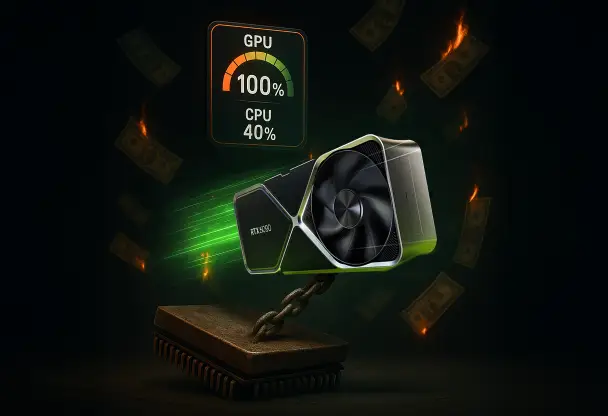
Let me give you an example: a friend with an NVIDIA RTX 3080 was surprised by stuttering in games. Our PC part compatibility checker showed that his older Intel Core i5-9400F was causing a CPU bottleneck. An upgrade to an Intel Core i9-10900K unlocked the GPU‘s full potential, resulting in smooth frame rates
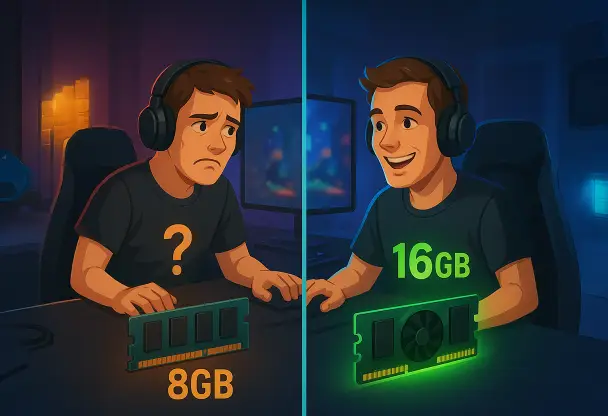
Another friend was getting strange problems in games despite a good CPU and GPU. Turns out 8 GB of RAM just wasn’t cutting it. Jumping to 16 GB of high-speed DDR4 RAM made a huge difference, showcasing how crucial other components are for system performance.
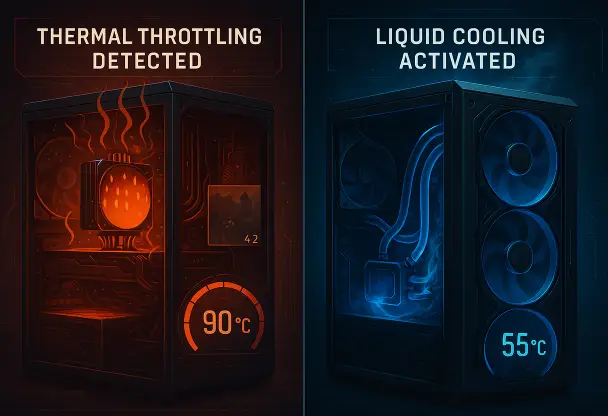
You might even have powerful parts but encounter thermal throttling. A user noticed their high-performance setup dropping performance during intensive tasks. So we upgraded their cooling system from a stock air cooler to more efficient liquid cooling that ended up resolving the issue
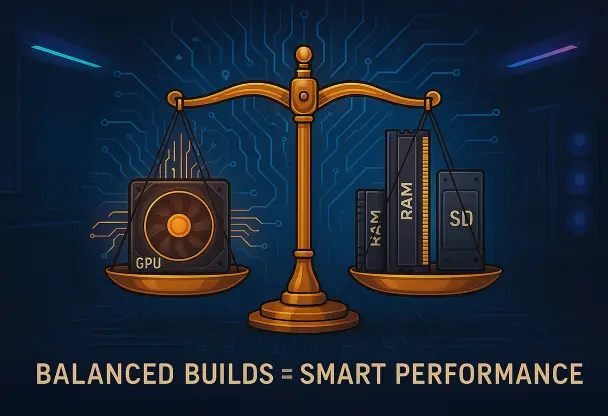
We not only want power but a balanced one. That’s where a bottleneck calculator like ours becomes useful, as it ensures your CPU and GPU are matched properly and that your RAM and storage aren’t weak links, creating a balanced system build that maximizes every dollar you spend.
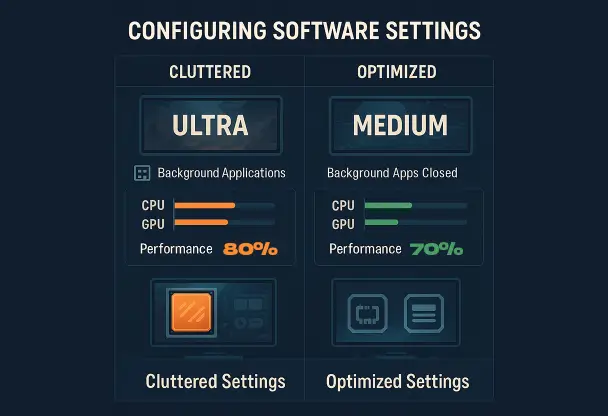
Sometimes, it’s not just hardware. Optimizing game settings or closing background applications can reduce demand on your CPU or GPU, giving you a temporary boost
As we discussed in depth about the bottleneck calculator and its calculations, let’s discuss a little deeper for the tech lovers
Sometimes, your internet connection can be your bottleneck in online games or streaming. It’s less about hardware and more about bandwidth.
Operating system processes, background applications, and even game engines themselves can influence how your CPU and GPU perform
Everything from your motherboard compatibility to the quality of your power supply requirements can affect overall efficiency
Bottlenecks are a pain, but using the right bottleneck calculator makes fixing them easy. Our PC Bottleneck Calculator gives you clear, trusted insights to boost your system’s performance. Test your PC now and take the first step to a smoother experience.
Yes . If your CPU is too slow, it can’t feed data fast enough to your powerful graphics card, causing a GPU bottleneck
Your CPU runs at 100% utilization, while your GPU might be underperforming , leading to lower frame rates and stuttering
Our bottleneck calculator uses real-world benchmarks and hardware data to give you a reliable estimate. It’s built to help gamers and creators get the most from their setup.
New games and apps demand more if balanced today might show a little bottleneck next year.
Anything below 5-10% is considered acceptable. Over that performance can lack impacting your gaming or big tasks